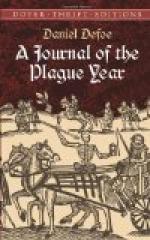Certain it is, the greatest part of the poor or families who formerly lived by their labour, or by retail trade, lived now on charity; and had there not been prodigious sums of money given by charitable, well-minded Christians for the support of such, the city could never have subsisted. There were, no question, accounts kept of their charity, and of the just distribution of it by the magistrates. But as such multitudes of those very officers died through whose hands it was distributed, and also that, as I have been told, most of the accounts of those things were lost in the great fire which happened in the very next year, and which burnt even the chamberlain’s office and many of their papers, so I could never come at the particular account, which I used great endeavours to have seen.
It may, however, be a direction in case of the approach of a like visitation, which God keep the city from;—I say, it may be of use to observe that by the care of the Lord Mayor and aldermen at that time in distributing weekly great sums of money for relief of the poor, a multitude of people who would otherwise have perished, were relieved, and their lives preserved. And here let me enter into a brief state of the case of the poor at that time, and what way apprehended from them, from whence may be judged hereafter what may be expected if the like distress should come upon the city.
At the beginning of the plague, when there was now no more hope but that the whole city would be visited; when, as I have said, all that had friends or estates in the country retired with their families; and when, indeed, one would have thought the very city itself was running out of the gates, and that there would be nobody left behind; you may be sure from that hour all trade, except such as related to immediate subsistence, was, as it were, at a full stop.
This is so lively a case, and contains in it so much of the real condition of the people, that I think I cannot be too particular in it, and therefore I descend to the several arrangements or classes of people who fell into immediate distress upon this occasion. For example:
1. All master-workmen in manufactures, especially such as belonged to ornament and the less necessary parts of the people’s dress, clothes, and furniture for houses, such as riband-weavers and other weavers, gold and silver lace makers, and gold and silver wire drawers, sempstresses, milliners, shoemakers, hatmakers, and glovemakers; also upholsterers, joiners, cabinet-makers, looking-glass makers, and innumerable trades which depend upon such as these;—I say, the master-workmen in such stopped their work, dismissed their journeymen and workmen, and all their dependents.




